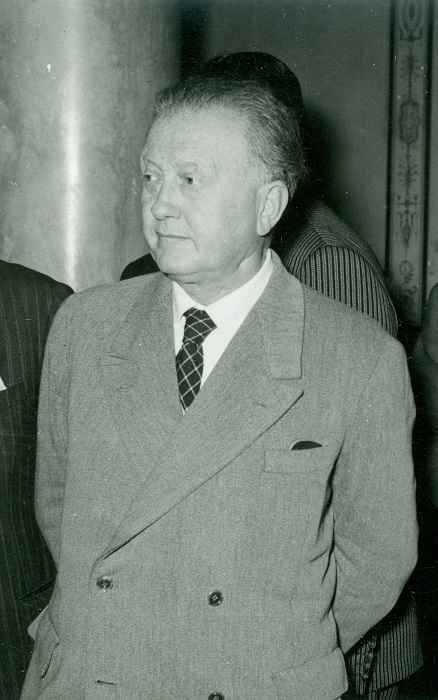Biography of Biagio Marin
The poet Biagio Marin was born in 1891 on the island of Grado, at the time part of the territories governed by the Austro-Hungarian Empire. He lost his mother aged five and was entrusted to the care of his paternal grandmother, to whom he would remain bound by a profound spiritual link and one of affection throughout his life.
Having completed first school, he attended preparatory courses in Gorizia to be admitted to the German language secondary school, with an education that would conclude at the royal Italian language secondary schools in Pisino d’Istria in 1911. That same year, he went to Florence, where he frequented the club of intellectuals gravitating in the orbit of Prezzolini’s magazine “La Voce” and met Guido De Vescovi, Virgilio Giotti, Umberto Saba, Alberto Spaini, Giani e Carlo Stuparich and Scipio Slataper from Trieste, with whom he enjoyed a very close, albeit brief, friendship.
In 1912, he enrolled with the University of Vienna, where he attended the courses run by the Faculty of Philosophy for two years: he enriched both his musical knowledge - listening to Beethoven and Bach - as well as his literary understanding, with the discovery of Russian and Scandinavian authors. Back in Florence in 1914, he became engaged with Pina Marini, whom he married the following year and with whom he would go on to have four children. That same year, following the attack launched on Sarajevo, he was summonsed by the Hapsburg army to attend the trainee officers course in Marburg, in view of the call to arms. Back in Grado, he deserted and enrolled in 1917 as a volunteer in the Italian army against Austria, but severe health problems meant he was hospitalised without ever having gone to fight at the front. After the war, he resumed his university studies - under Giovanni Gentile - and graduated in theoretical philosophy from Rome in 1919.
He settled in Gorizia, where he devoted his time to teaching at the Teaching college, until he was removed from the position following conflict with the local clergy.
1923 saw him start managing the company responsible for the baths and then thermal baths in Grado, but in 1937, accused of subversive activities against the fascist regime, he was dismissed and exiled from the island.
In 1938, he and his family settled in Trieste, where he went on to live for another 30 years. In 1942, he was hired to a permanent position as librarian at the Trieste site of Assicurazioni Generali. Suffering greatly for the death of his son, Falco, who died during combat in 1943, in 1945 Marin joined the local National Liberation Committee (C.L.N.).
After the war, he worked intensely as a publicist, writing for newspapers and magazines, both under his own name and with the pseudonym Piero d’Orio. Marin was also one of the founding members of the Club of Culture and Arts, managing the Humanities Section for a good 17 years.
Author of an immense work in verse and prose, he began publishing his first poems in Grado dialect in 1912, with the “Fiuri de tapo” collection. In 1952, he was included in the anthology “Poesia dialettale del Novecento”, edited by P. P. Pasolini and G. Dell’Arco, which earned him significant visibility amongst an extensive public and the first acknowledgements from critics. Over the following years, he won the Bagutta, Viareggio and Feltrinelli prizes for poetry.
All his poems published up to 1982 were brought together in two volumes, “I canti de l’Isola 1912-1969”, published in 1970 and “I canti de l’Isola 1970-1981” published in 1981. A third volume then followed in 1994, made up of the poems published from 1982 to 1985.
Yet his Diaries, intimate, personal notebooks, were no less important than his poetic writings. It was here that Biagio Marin, from 1941 and until his worsening blindness eventually stopped him from writing, noted down his reflections, revealing not only the thoughts, private life and relations of the poet - many of the letters he received are transcribed in these Diaries - but also the unfolding of the historic events as they were experienced by Marin.
Biagio Marin died in 1985, in his much-loved Grado, to which he had returned in 1969.
Selected works
Poetry
I canti de l’Isola 1912-1969, Trieste 1970
I canti de l’Isola 1970-1981, Trieste 1981
Rama de rosmarin. Poesie 1980-1985, a cura di E. Serra, Milano 199180-85
Prose
Grado l'isola d'oro, Grado, 1955;
Gorizia la città mutilata, Gorizia, 1956;
I delfini – Slataper, Milano, 1965;
Strade e rive di Trieste, Milano, 1967
Selected bibliography
Serra E., Biagio Marin, Pordenone 1992
Camuffo P., Biagio Marin, la poesia, i filosofi: tracce per una interpretazione, Monfalcone 2000
Publications
Marin B., Appunti di notte e di mattina presto
Marin B., Considerazioni sui problemi del mio tempo e appunti vari

